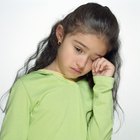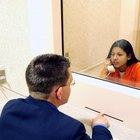
When children are suffering from mental or emotional problems, they don't always know how to explain what they are feeling. Sometimes they're embarrassed, other times they're confused and don't understand what's happening to them. As a parent, it's important to look out for warning signs that your child is troubled so you can get her the help she needs.
Change in Behavior
A main warning sign that a child is troubled is a drastic change in his behavior. It's not just a bad mood or an off day but a consistent pattern of new conduct. On his website, Dr. Phil McGraw indicates that your child may show this by talking to you much less than normal or isolating himself in his room. The American Psychiatric Foundation also reports that the behavior might not just be directed at you; new and persistent disrespect toward authority figures can be another sign of trouble. Also be on the lookout for changes in his emotional reactions. Extreme mood swings, persistent sadness and increased anxiety levels often signal problems like depression.
Trouble at School
The American Psychiatric Foundation also warns that when children are struggling with emotional issues, they often have trouble dealing with the stress of daily life. This is often reflected in a noticeable difference in school performance. Some children can't concentrate in class while others begin to complain of frequent aches and pains in order to stay home. Older children might take things into their own hands and go to school late or skip the day entirely. This can create a vicious circle: The more they miss, the further behind they get, and the more stressful it is to try to get caught up.
Breaking the Law
Many troubled children act out against authority by breaking the law. On the Helpguide.org website, Lawrence Robinson and Jeanne Segal point out that although many kids experiment with drugs and alcohol, the habitual use of illegal substances is a warning sign that they are struggling with deeper issues. This is also true if they may begin to steal from family members or shoplift in stores. In addition, if a child begins stealing or vandalizing property, it shows that she is having trouble connecting her behavior to consequences. It is important not to minimize this behavior but to confront it and seek professional help if necessary.
Violence
The most worrisome sign of a troubled child is violence toward himself or others. Some depressed children turn to cutting and other self-harm as an outlet for their negative emotions. Children who are struggling with other emotional issues may turn their anger outward, lashing out aggressively at you or other family members. Robinson and Segal advise seeking help if your child is starting fights, making threats, fantasizing about violence, or hurting other children or animals.
Related Articles

Signs You Are Married to a Bully

Three Warning Signs of Neglect

How Does an Overbearing Mother Affect a ...

Signs of Mental Abuse in Children

The Effects of Children Witnessing ...

Signs of a Pervert

The Disadvantages of Physical ...

Long-Term Effects of Being Molested As ...

What Is Identity Crisis During ...

Psychological Effects of Fatherlessness

The Effects of Sibling Jealousy

Aggressive Behavior in Adults

The History of School Uniform

How to Deal With an Abusive Sibling

Psychological Effects of Losing a ...

Traumatic Effects of a Bad Marriage on ...

Early Signs of Contempt

Parental Rejection in Adulthood

How to Handle Challenging Behavior from ...

Symptoms of Adult Survivors of Child ...
References
Writer Bio
Kimberly Yates has been both writing and teaching since 1997. She has been published in a variety of magazines, including "The Alfred Hitchcock Mystery Magazine" and "Woman's World." She has a Bachelor's degree in English and a Masters in English education.
Photo Credits
AntonioGuillem/iStock/Getty Images